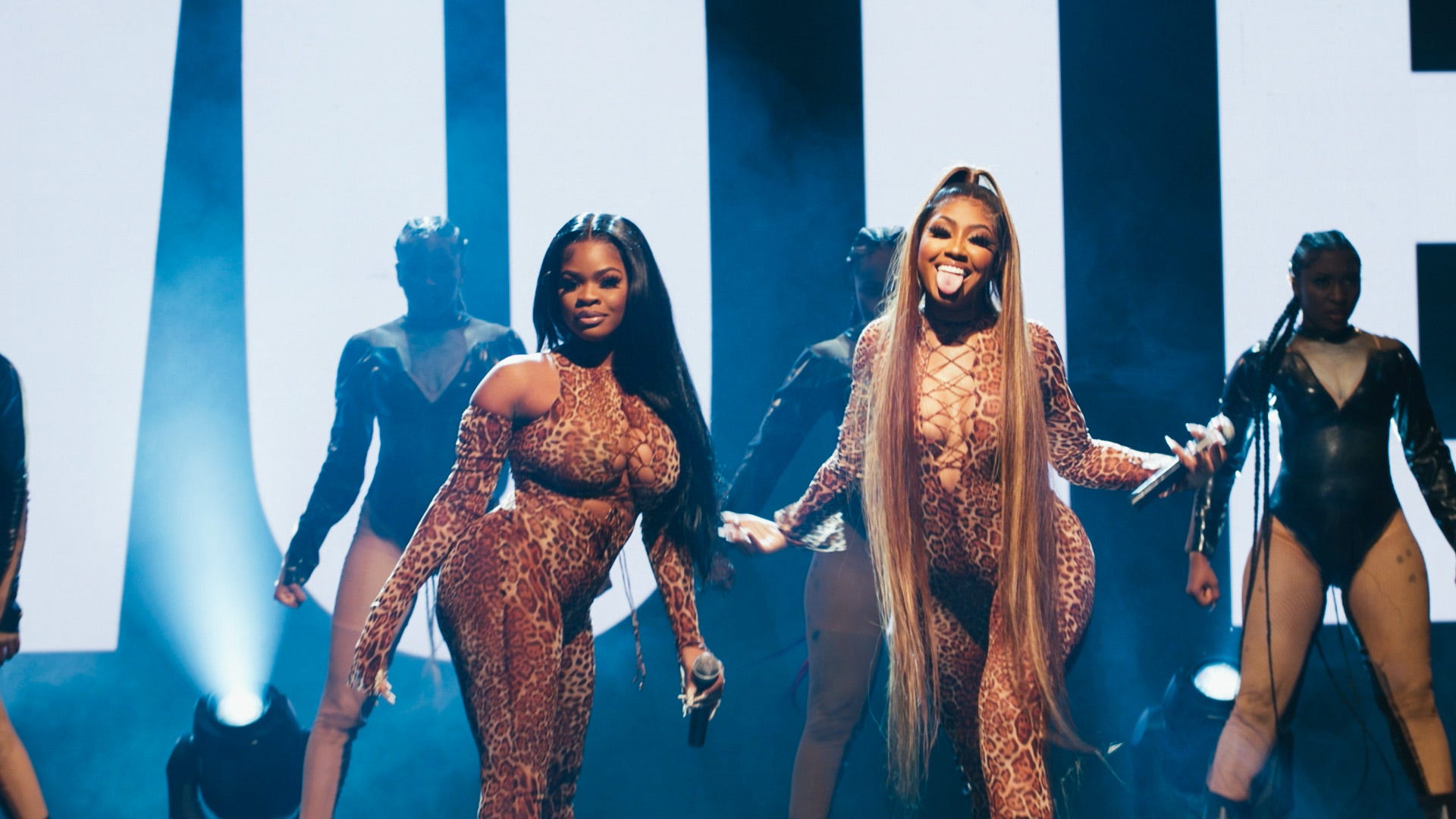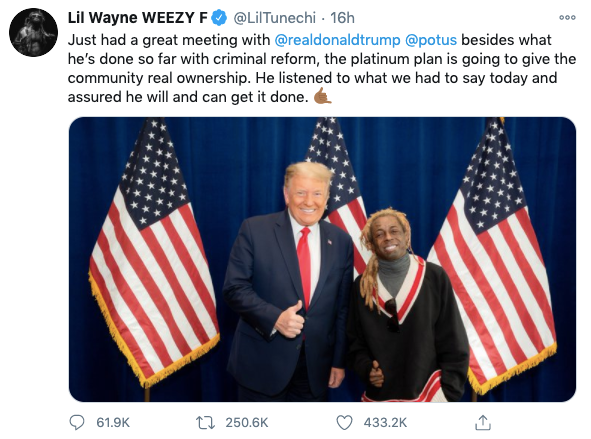DJ COMMUNITY
Hip-Hop Is a Viable Voting Bloc
Don’t sleep on Cardi B, Ice Cube, and others. Rappers can harness a vote.
Ronda Racha Penrice
Oct 30·7 min read

City Girls perform at the 2020 BET Hip Hop Awards. Photo: BET
Contrary to mainstream eyerolls, twerking isn’t a political disqualifier for Cardi B, City Girls, or anybody else who embraces their “WAP” or being “flewed out.” If we believe in democracy, we have to believe in the right of us all to participate in it. Keep ignoring hip-hop as a political block if you want, but it won’t stop “the culture” from politically engaging.
That truth was certainly on display during the BET Hip Hop Awards. At the end of the City Girls barely-safe-for-TV leopard catsuit performance of “Kitty Talk” and “Jobs,” the word VOTE appeared behind them. On top of that, popular website The Shade Room is running their “When We All Vote” PSA message letting “everyone who’s been incarcerated,” like JT, one-half of the City Girls racy duo, has, know “your voice does matter.”
Back in August, Cardi B sat down with Democratic presidential candidate Joe Biden via a Zoom call captured by Elle magazine to cover a myriad of topics of special concern to women of color, including police brutality, health care, and childcare. In April, Cardi, who supported Bernie Sanders throughout the Democratic primaries, gave the Vermont senator a spotlight via her Instagram Live to voice why he supports his one-time campaign adversary Biden over Trump for POTUS.
The “Okurrr” rapper’s public foray into politics, blasting Trump during the government shutdown in 2019 was not immediately welcomed. BuzzFeed News reported about two senators — U.S. senator Brian Schatz from Hawaii and Connecticut senator Chris Murphy — debating on Twitter whether or not to retweet Cardi B’s insightful observation, with U.S. senator Chuck Schumer weighing in. Conservative mouthpieces like Tomi Lahren, Mindy Robinson, and Candace Owens, all with questionable histories of their own, have tried Kulture’s mama in one way or another, be it blasting her for her criticisms of Trump during the shutdown, ridiculing her political ambitions, or questioning her single “WAP” and her political acumen.

While some find it odd or inappropriate for an “ex-stripper” to openly express her political views or even sit down with politicians,, Cardi B makes all the sense in the world to tons of “regular” people. Counter to popular mischaracterizations, rappers often do have their ears to the streets. Just because Cardi B and the City Girls rap about Birkins and Chanel bags doesn’t mean they’ve forgotten about their lives prior to their current good fortune. Realistically, how could they? They aren’t even that many years removed from whence they’ve come.
Unequal pay or limited career options aren’t theoretical talking points either. Cardi B and JT know these frustrations better than any politician. Even as a high school AP Government student, the stripper pole was more accessible to a girl like Cardi B from the hardscrabble Bronx than college. In Little Fires Everywhere, Kerry Washington’s Mia Warren, a struggling artist who went to college, informs the more well-to-do Elena Richardson, played by Reese Witherspoon, “you didn’t make good choices. You had good choices. Options that being rich and White and entitled gave you.”
And that truth is not just made-for-TV. It’s real life. As a convicted felon who was just released last year after serving 24 months, JT cannot cast her vote in this election in her native Florida.”You guys, (I) can not vote!” the Miami native tweeted per Revolt. “Thanks for all the pointers, but I’m not allowed to this election. All other felons look into what option is best for you in your state!” So voting rights for all is not just a cause to her; it’s personal.
Just because Cardi B and the City Girls rap about Birkins and Chanel bags doesn’t mean they’ve forgotten about their lives prior to their current good fortune. Realistically, how could they?
These lived experiences are why rappers like JT and Cardi B have a certain credibility with a large contingent of Black and Brown voters. Frankly a lot of rappers inhabit a space that many establishment political advocates and elected officials don’t. So, oftentimes, they are talking to the people, not at them. Police brutality, for instance, isn’t a cause du jour that the hip-hop community discovered after the police killing of George Floyd. That outrage has long been there.
When Megan Thee Stallion ended her kickoff performance for the 2020 season premiere of Saturday Night Live blasting Kentucky Attorney General Daniel Cameron’s failure to hold the cops who killed Breonna Taylor accountable, she wasn’t just making a personal statement. She was reflecting the consensus among not just the social justice-minded members of the hip-hop community.
Rappers as diverse as trap prince Lil Baby and classic lyricist Rapsody to Houston inspirational wordsmith Tobe Nwigwe, who is also first-generation Nigerian-American, and hip-hop icon Master P, who all appeared on the BET Hip Hop Awards, have also all evoked Breonna Taylor’s name in rhyme. Like The Shade Room, other hip-hop friendly sites like Bossip have joined such sites as HipHopDX and Hot 97 to keep Breonna Taylor’s police killing in the forefront. When the grand jury finding was reported, Snoop, Common and Christian rapper Lecrae were among those using so... Without question, hip-hop has been the driving force keeping Breonna Taylor’s name alive in the first place.
In the NatGeo docuseries City So Real, the cameras pull the layers back on Chicago politics with a look at the role the city’s own Chance the Rapper and Kanye West played in making former mayoral candidate Amara Enyia a viable voice in the most recent mayoral election. In Atlanta, when current Mayor Keisha Lance Bottoms ran for office in a tight-race against the Trump-leaning candidate Mary Norwood back in 2017, hip-hop helped pull her through. Atlanta’s own T.I. and Killer Mike went to bat for Lance Bottoms. Up-and-coming male rapper Top Notch also rapped the mayor’s entire resume in the “Keisha Lance Bottoms Anthem” that helped move the needle, particularly with young people. Music industry veteran Phillana Williams, who once led urban marketing at Arista and Island Def Jam for the likes of OutKast, Ne-Yo, and Ciara, served as Bottoms’ campaign spokesperson.
After her win, Bottoms, daughter of the late R&B recording artist Major Lance, spoke to a room of mostly Black journalists and shared that “this is the first major election in this city where we’ve had to engage a certain age group and demographic in a way most of us didn’t know how to do it . . . when you have an election that’s decided by less than 900 votes like our election was, it really speaks to the power of the voices in our community that often go unheard.”
Those voices are playing as pivotal a role in this presidential race as they did in Obama’s elections in 2008 and 2012, most visibly with Sean “Diddy” Combs’ “Vote or Die!” campaign, which he later adapted to “Obama or Die!” Combs started Citizen Change, the organization’s government name, back in 2004 when Democrat John Kerry ran against Republican George Bush. Among youth, that push seemed to work as Kerry, according to the nonpartisan Center for Information and Research on... got 54% of the youth vote to Bush’s 44%, an increase from Dem Al Gore’s 48% in 2000. With Trump’s election in 2016, the Pew Research Center reported a Black voter turnout decrease, wi.... And though Combs, joining such early critics as Killer Mike, criticized the Black community’s blind loyalty to the Democrats earlier this year, he relaunched his Vote or Die! efforts at the end of September with a town hall.
With Ice Cube’s meeting with Trump campaign officials and criticisms of the Biden campaign around his Contract With Black America still making news and inspiring a Los Angeles Times op-ed about Black male voters supporting Trump, it’s clear that hip-hop’s political impact is substantial. That realization is no doubt why Biden’s VP running mate Kamala Harris, an HBCU alum of Howard University, showed up on the BET Hip Hop Awards to introduce rappers 2 Chainz and Lil Wayne’s performance of their HBCU anthem, “Money Maker.” The irony, of course, is Lil Wayne endorsed Trump for re-election two days after the awards show aired October 27, appearing in a photo with him and all.
Republican or Democrat, being present in hip hop is essential and it is a key part of Harris’ quest to become the first Black or woman VP of the United States and Trump’s re-election campaign. Clearly, the Black vote, particularly that of those 35 and younger, is increasingly tied to hip-hop, which of course reverberates to the even larger non-Black demographic of the genre’s fans. And, to get it, politicians are getting with the flow. Because, going forward, the last thing that’s dead is hip-hop’s political influence.
Views: 12
Comment
© 2025 Created by Janelle.
Powered by
![]()
You need to be a member of NASTYMIXX to add comments!
Join NASTYMIXX